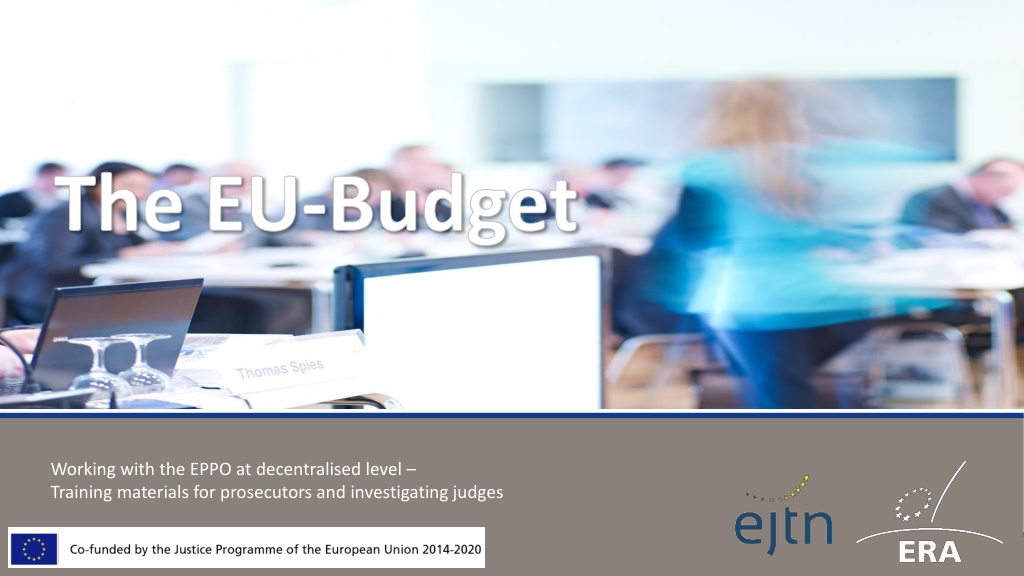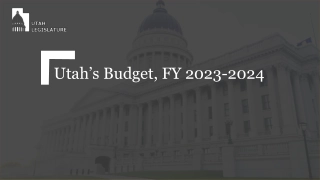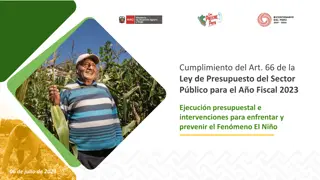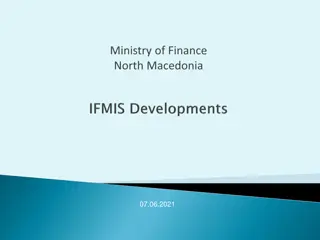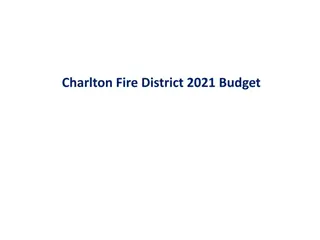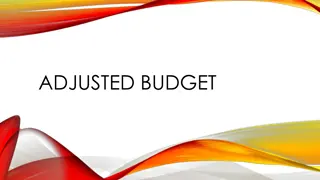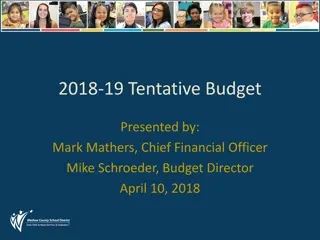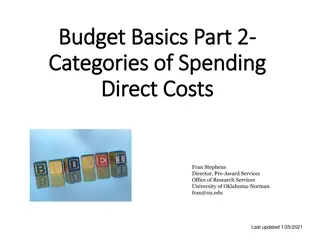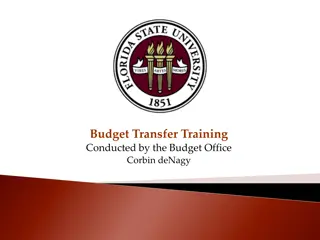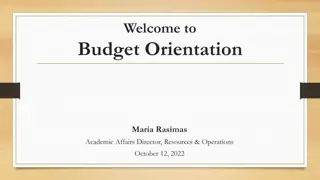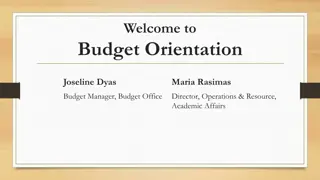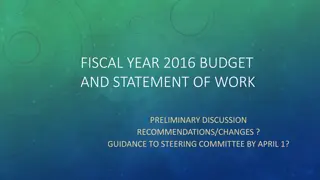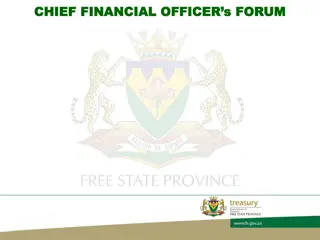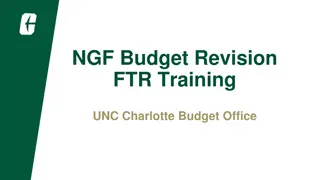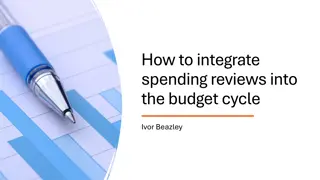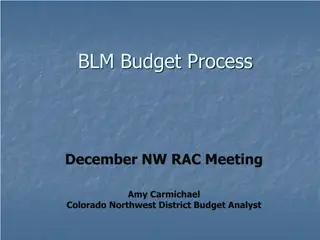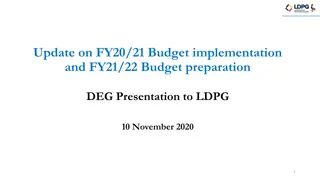Understanding the EU Budget and Financial Framework
Explore the European Union budget and its importance, including the Multiannual Financial Framework (MFF) for long-term planning. Learn about the annual budget process, funding sources, and how funds are allocated across different areas. Test your knowledge with quizzes and discover why discussions on the EU budget are crucial for safeguarding the Union's financial interests.
Download Presentation

Please find below an Image/Link to download the presentation.
The content on the website is provided AS IS for your information and personal use only. It may not be sold, licensed, or shared on other websites without obtaining consent from the author. Download presentation by click this link. If you encounter any issues during the download, it is possible that the publisher has removed the file from their server.
E N D
Presentation Transcript
The EU-Budget Working with the EPPO at decentralised level Training materials for prosecutors and investigating judges 1
OVERVIEW 1. WHY DO WE NEED TO TALK ABOUT THE EU BUDGET? 2. WHEN IS THE EU BUDGET AGREED? 3. HOW BIG IS THE EU BUDGET? 4. WHAT IS IT SPENT ON? 5. WHERE DOES MONEY COME FROM? 6. WHO IMPLEMENTS THE EU BUDGET? 2
1. WHY do we need to talk about the EU Budget? EPPO is set up for the protection of the financial interests of the EU = Art. 4 Council Regulation 2017/1939 (EPPO Regulation) Wide concept = Art. 2 Directive 2017/1370 on the fight against fraud to the Union s financial interests by means of criminal law (PIF Directive) - all revenues, expenditure and assets (wide concept reflected in ECJ rulings e.g Taricco) - covered by, acquired through or due to the Union budget, the budgets of the EU institutions, bodies, offices and agencies or budgets - directly or indirectly managed and monitored by them Need to have some notions about the EU budget 3
2. WHEN is the EU Budget agreed? 4
QUIZ- TEST YOUR KNOWLEDGE 2. WHEN is the EU budget agreed? A) The EU budget is decided on an annual basis B) There is a long-term framework which sets the budget for a 7-year period 5
Multiannual Financial Framework (MFF): Long-term EU Budget (7-years) https://www.youtube.com/watch?v=QEKBOrXjljU - Framework for financial programming and budgetary discipline: sets the limits (ceilings) of what EU can spend during the period (overall and per field of action heading )/ includes mechanisms to ensure flexibility to deal with unforeseen needs - Allows EU to align expenditure with political priorities and to carry out policies over a sufficient period of time to make them effective. - The 2014-2020 MFF was divided into six main areas of expenditure or headings : smart and inclusive growth, sustainable growth, security and citizenship, global europe, administration and compensation. - The next MFF will cover the period 2021-2027 6
Annual EU Budget is established within the limits provided by the MFF: - total commitments in a given year = maximum number of legal obligations (e.g contracts/grants the EU can engage in) - total payments in a given year = actual amounts spent in a year (can arise from legal commitments made in previous years) - payments and commitments per area of EU spending (heading) Lays down all the EU s expenditure and revenue for 1 year that must always be in balance (debt not possible) Covers a 3-year lifecycle: preparation-adoption-implementation- control 7
QUIZ- TEST YOUR KNOWLEDGE Who decides about the EU budget? A) The European Commission B) The European Commission and the Member States C) The European Commission and the Member States after conducting a Eurobarometer survey to hear the citizens views Answer D) is correct. D) The EU Budget is proposed by the Commission and approved by the Council and European Parliament 8
ANNUAL BUDGETARY PROCEDURE Art. 314 TFEU: special legislative procedure between 1 September to 31 December of each preceding year STEPS 1. The European Commission first proposes a draft annual budget. 2. The draft budget must be approved by national governments in the Council of the EU and by the directly elected European Parliament. 3. Both the Council and Parliament can amend the draft. 4. The Council and Parliament approve the final version. WHAT HAPPENS IF NOT ADOPTED IN TIME? - System of provisional twelfths (Art. 315 TFEU) 9
THE MFF The Commission presents the MFF package which mainly includes: An MFF Regulation setting out the limit of EU expenditure An Own Resources decision, which defines where the EU revenue comes from The MFF Regulation is adopted under a special legislative procedure : Main differences with Annual Budget procedure Unanimity is required in the Council The consent of the European Parliament is required but The European Parliament cannot make amendments to the Council s position: only approve or reject it (power to veto). In the initial MFF proposal, the Commission also proposes instruments for sectoral programmes in the different areas of action for the new programming period. These are generally adopted by ordinary legislative procedure. 10
3. HOW BIG is the EU Budget? 11
QUIZ- TEST YOUR KNOWLEDGE How big was the 2020 annual EU budget? A) Around 890 million euro B) Around 170 billion euro Answer B) is correct. C) Around 1 trillion euro 12
EU Budget for 2020 The EU budget for 2020 is worth (amendments included): 172.5 billion in commitments - ability to contract legal obligations (for example sign contracts) up to that ceiling in 2020 155.4 billion in payments - actual spending in 2020 On 14 April 2020, the Council adopted two amendments, to provide additional support where most needed. In particular, 3.1 billion were directed to fight the COVID-19 pandemic and 350 million to support Greece in its response to increased migratory pressure. 13
TEST YOUR KNOWLEDGE In perspective . What is equivalent to the EU citizen s daily contribution to the EU Budget? A) A glass of tap water B) A cup of coffee C) A glass of sparkling wine D) A bottle of champagne 15
4. WHAT is the EU Budget spent on? 16
QUIZ- TEST YOUR KNOWLEDGE What was the 2020 Budget spent on? Order the headings by size 1. Competitiveness for growth and Jobs 2. Economic, social and territorial cohesion 3. Sustainable growth (natural resources) 4. Administration 5. Security and citizenship 6. Global Europe 17
MFF 2014-2020 Programmes funding by heading 19
HEADINGS IN MORE DETAIL SUSTAINABLE GROWTH Common Agricultural Policy support to farmers incomes in the form of direct payments and market-support measures. European Maritime Affairs and Fisheries managing European fishing fleets and conserving fish stocks Programme for the Environment and Climate Action (LIFE) implementation of EU policies in the field Rural Development toimprove the rural economy 20
Other examples: ECONOMIC, SOCIAL, TERRITORIAL COHESION Cohesion Fund, European Regional Development Fund and European Social Fund COMPETITIVINESS FOR GROWTH AND JOBS Competitiveness of Enterprises and SMEs (COSME), Hercule III, Erasmus +, Galileo, Horizon 2020 21
Other examples: SECURITY AND CITIZENSHIP Asylum, migration and integration Fund, Creative Europe, Internal Security Fund GLOBAL EUROPE Development Cooperation Instrument, European Neighbourhood Instrument, Instrument for Pre-accession Assistance (IPA II) EU budget concerns us all https://ec.europa.eu/budget/euprojects/search-projects_en 22
EU EXPENDITURE 2021-2027 (as approved by the Council in July 2020) TOTAL: 1,824.3 BILLION EURO MFF MFF 1,074.3 1,074.3 BILLION BILLION NEXT GENERATION EU COVID-19 recovery package 750 BILLION 24
Breakdown of EU spending 2021-2027 Spending areas and some of the instruments included: single market, innovation and digital (Horizon Europe/InvestEUfund) cohesion, resilience and values (Cohesion policy funds/Recovery and resilience facility/Union civil protection mechanism/Health programme) natural resources and the environment (Common Agricultural Policy/Just Transition Fund) migration and border management (Asylum and Migration Fund/Integrated Border Management Fund) resilience, security and defence (European Defence Fund/ Internal Security Fund) neighbourhood and the world (Neighbourhood, development & international cooperation instrument/ Humanitarian aid instrument) European public administration . This is the expenditure you have to protect but is that all? 25
5. WHERE does the money come from? 27
EU REVENUE Main source of revenue = OWN RESOURCES A) Traditional own resources (TOR) = mainly customs duties and sugar levies B) National contributions State C) based on Gross National Income D) National contributions calculated on the Value Added Tax (VAT) base of each Member Less important: Surplus EU revenue (what remains after payments each year) & others (e.g competition fines, taxes on salaries) https://ec.europa.eu/budget/graphs/revenue_expediture.html 28
GNI-based own resouce 2019 (EUR million) 25000 20000 15000 10000 5000 0 BE BG CZ DK DE EE IE EL ES FR HR IT CY LV LT LU HU MT NL AT PL PT RO SI SK FI SE UK 29
EU REVENUE The Council decides the maximum amount of own resources and their types at the same time as the limits for expenditure within the multiannual financial framework. New own resources? Taxes on recyclable plastic / ETS (emissions trading system) / operation of large companies / digital tax? Once agreed, these resources are automatically directed to the EU budget, without the need for any further decision by the national authorities. Some countries receive reimbursements or rebates that serve to reduce the difference between what they pay into the EU budget and what they receive from it. 30
QUIZ- TEST YOUR KNOWLEDGE https://www.europarl.europa.eu/news/en/headlines/priori ties/eu-s-long-term-budget/20200220STO73009/quiz-test- your-knowledge-of-the-eu-s-long-term-budget 31
6. WHO implements the EU Budget? 32
Article 317 TFEU The Commission shall implement the budget in cooperation with the Member States, in accordance with the provisions of the regulations made pursuant to Article 322, on its own responsibility and within the limits of the appropriations, having regard to the principles of sound financial management. Member States shall cooperate with the Commission to ensure that the appropriations are used in accordance with the principles of sound financial management. The ultimate responsibility for implementing the Budget lies with the European Comission but in practice more than 70% of the budget is spent under shared management where EU member states distribute the funds and manage expenditure. The EU Member States also collect the EU s traditional own resources. 33
DIRECT- INDIRECT- SHARED Management The Budget can be implemented : DIRECTLY by the EU Commission (but also EU Delegations, executive agencies ) INDIRECTLY entrusting it to other bodies inside/outside the EU (e.g., third countries, international organisations like the UN and Red Cross, European Investment Bank and European Investment Fund ) JOINTLY by the European Commission and the Member States (e.g. in cohesion policy, common agricultural policy) Example: European Structural and Investment Funds (ESIF) (including Cohesion Fund, European Regional Development Fund, European Social Fund, European Agricultural Fund for Rural Development & European Maritime and Fisheries Fund) through which half of EU funding is channelled are under shared management. 34
Art.325 (2) TFEU requires Member States to take the same measures to counter fraud affecting the financial interests of the Union as they take to counter fraud affecting their own financial interests . Financial Regulation 2018/1046 contains the detailed rules governing the EU budget & a wide- rage of internal and external controls CONCLUSION The responsibility for protecting the EU s financial interests is shared between the European institutions and the Member States. Member States are obliged to cooperate with the Commission, the Anti-Fraud Office (OLAF), the Court of Auditors and the EPPO to prevent and fight fraud. 35
FINAL QUIZ- TEST YOUR KNOWLEDGE Fraud affecting the European Budget: A) Is a victimless crime, as the EU Budget, as it does not affect concrete individuals B) Solely affects the European Commission C) Affects the Commission, Member States and all EU citizens and taxpayers Answer C) is correct. 36
Thank you for your attention WWW.EUROPEAN.LAW
